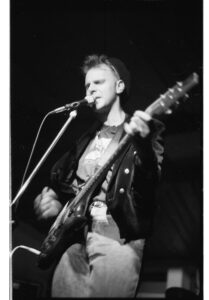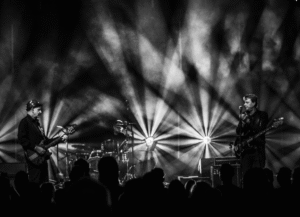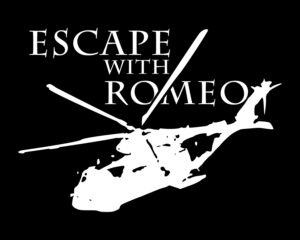Who hasn’t been ever moved by “Somebody,” the first hit from Escape with Romeo? The Germans nailed it with this emotive track, which was especially popular in Spain. That was in the late eighties, and over the following years, the band continued to deliver great albums like Autumn on Venus, evolving towards a more electronic style while retaining their signature sound. After a short hiatus, they returned with renewed energy, releasing a new album last year in which, once again, the guitars come to the forefront. In November, they return to Spain, this time to perform at the Madrid festival Santuario.

Photo: Flora Jörgens
—As I am now discovering a lot of mudiv from the NDW, I would like to start the interview with a question about Seltsame Zustände, your “first” band. A few years ago, Reptile Music reedited your album from 1984. How do you remember those NDW years in Germany? How did you live them?
—The NDW years were wild, and everybody could be in a band. We took that very seriously and started Seltsame Zustände, which wasn’t my first band, but the one that I made my first album with. We had to learn the hard way. We had ideas how we wanted to sound, but the guy in the studio finally decided, because he had the skills and knew how everything worked there. In retrospect we were very unhappy with the sound but that’s the way it goes. And the NDW time changed a lot in the German music scene parallel to the scene in UK. The Big Bands were the enemy, the new bands were the avantgarde, at least we though so…
—Before you recorded music on a cassette-only label called Reinfall Tapes, under the name T.E. Musik. What do you remember of your first recordings?
—My father bought me a tape machine, on which I did my first recordings. That was end of the 1970’s and started my recording career. Then the 4-track and later 8-track cassette recorders came on the market and changed everything. All I had was that machine, my guitar, a bass, a Casio keyboard, a microphone and a Peavey amp. That started the way I could do demos. So, I could experiment a lot with what I had and songs like “White room” and others were born. It was a liberation. Remember: in those days you’ve had to go in a studio to make a proper record. Now I could record anytime, any day and anything. But only in demo quality. That’s what you hear on T.E. Musik. It’s very very rough and unpolished and from my point of view now, ages ago!
—Also, you were the founder of Pink Turns Blue and you played in the classic If Two Worlds Kiss. Without wanting to reopen old wounds, why did you leave the band?
—The main reason was that I could do a show with independent music in the national radio. Like John Peel did in the 8oties, which heavily influenced me. But being in the media consumed too much time, that I could not be in a band anymore. So that radio show made me an influencer at that time and suddenly I was a well-known person which was not always nice. Also, it killed my own music activities the first years.
—After all these experiences, it’s kind of normal that the first Escape with Romeo was quite an accomplished work. Were you ready for the success of “Somebody”?
—I don’t see the first album as an accomplished work, but as everything we were capable of at that time. That album was hard to make and took a lot of weekends to be finished. And yes, I was surprised about the success of “Somebody”, especially in Spain. But it wasn’t our “Big in Japan” or “Sweet dreams”! It was an indie success in the upcoming wave and gothic scene, and it did not pay the bills but helped us be a touring and compact band.
—The difficult second album was Autumn On Venus. Now listening to all of them in order, I see an effort to make a better album than the first one. Was it difficult to compose after the success of the first EWR album?
—In retrospect we tried to make a more organic album, that sounded more like us as a live band. And the first album wasn’t a success right now. That came later over the years when we heavily toured Germany, so Autumn On Venus was a sort of statement of how the band was live. And even at that moment I was the only original member left compared to the first album.
—On that album there is the song “Helicopters In The Falling Rain” and from then the helicopter became the symbol of the band. You said that it represents escapism (like the name of the band). Do you think that nowadays we need to find an escape from reality even more than back in the 80s?
—Yes, it represents rescue and also danger. Think about Apocalypse now, where the helicopters stand for destruction. But I used the symbol to get that band name in a different direction than the angel on the first album cover, more on a meta level. Nowadays everything is escape from reality. Watch the news, read about the climate crisis and how aggressive right-wing leaders fuck up the world. YES: you want to escape in 2025, even more than ever!
—Were you tired of the music industry when you composed Next stop eternally?
—I think you are referring to the song “Music is dead”. That was me getting tired of hearing and valuing other people’s music, what you have to do when you do a radio show. You have to listen to a lot of music. And that could make you very tired. It wasn’t that much the music industry at that point, that was really healthy in the 9oties, no it was all the other cds and vinyls that stacked up endlessly on my desk. And that I had to hear to make a good program.
—You have made covers of bands from the 60s, from Donovan to Doors. As we hardly speak about this decade, are you or were you influenced by artists of the sixties?
—I listen to rock music since I’m 10 years old. I remember hearing “Starman” from Bowie or “Metal Guru” by T. Rex on the radio. That was 1970… a universe of music did follow that older friends introduced me to: From Pink Floyd to Frank Zappa, Neil Young to Aphrodite’s Child. And in the 8os, when I was in my 20s all the new wave stuff from Wire to Joy Division to Comsat Angels. There were millions of new influences to choose from. That cover version of Donovan was more a sort of punk answer to the original.
—From Blast of silence, the music of EWR becomes more electronic, although this influence was already in the band. What made you take this direction?
—When I did Blast of silence in the 9oties that was me alone in the studio. I discovered all the electronic toys, the synthesizers and the techno music. In retrospect that album isn’t very good, but there I’ve started to produce myself and had to learn a lot: I didn’t care if that music could be played live, it had to sound good in the studio. A very different journey started right there.
—Come Here White Light, the album from 2001, sounds a bit more trip hop. Are you usually influenced by what’s happening in modern music?
—Trip Hop was a logical evolution of that new wave sound of the 8os for me. It had that melancholy and that street vibe. I was really influenced by Unkle, DJ Shadow and Massive Attack that made stand out albums at that time. Also I always listen to new music, no matter what genre it is. It is the vibe that has to stand out and capture a certain feeling. Every genre has some of that. Examples: Talk Talk –Spirit of Eden, Steve Reich –Collected Works, Marvin Gaye –What’s going on, Sleep Token– Take me back to Eden, Aphrodite’s Child –666… the list is endless and forget genres!!!!
—That album was the first released on your label. Why did you start it, to get more freedom to do what you wanted?
—Putting out my own music on my own label and manage every business side of it was a necessary move. I had to learn a lot and still think to this day that being independent, although it’s much work, it is the best way to go. It’s the freedom and the control you have about every aspect of your career.
—You said that Samsara contained some “protest songs” and you wanted to give your anger and frustration a voice. Instead, the lyrics of Suspicious Bliss were inspired more by global events than personal experiences. Is it easier for you to write about your experiences or tackle more general problems?
—For me, it often depends on my state of mind and what’s happening around me at the time. Writing from personal experience can be cathartic and allows for a deep connection to the lyrics, but addressing broader, global issues gives me a chance to engage with the world and reflect on what’s going on. Both approaches have their challenges, but I try to balance them to keep my music honest and relevant. There is a lot of frustration and rage in some of my lyrics but I keep it on a broader level and try to find images to describe the scenario. In Suspicious Bliss you have the sniper on the rooftop or the guy alone in the capsule drifting through space. I have very clear images when I write and treat my songs as my favourite episodes when I watch a movie or series.
—You said that, in the end, were not very content with the After the future album? Why?
—Hard to say why, it was the end of a long phase in Escape with Romeo and the album did not reflect my mood that much. In retrospect I still see some really good songs here but also some that completely failed.
 —We were at what was, at the time, supposed to be the band’s last show at W-Fest. Why did you want to end the band?
—We were at what was, at the time, supposed to be the band’s last show at W-Fest. Why did you want to end the band?
—Everything was too stiff and every path was walked. It felt, nothing new will happen anymore.I needed a break from the old routine, but I didn’t know then, that it was just a break. It felt like everything was ending now.
—During the hiatus you started another project, Dirty Vocoder, with which you released an album with your singles (only on Bandcamp). Some of these songs also appeared on the last EWR album. Why did you start this project? Was it a kind of continuation of Escape with Romeo?
—Dirty Vocoder was a very different project that was planned to work very different. We planned the guy with the mask will become an avatar and everything was a dark comic happening, like a graphic novel. No live band, just animation. No singing, everything was coming out from the vocoder. It was a good idea, but it took too much work to realize all of it. But when I reactivated Escape with Romeo, I used some of the songs and transposed them back to a band level. It was because I realized that the vocoder songs are not too far from what EWR is now, but they needed a makeover.
—The comeback album was Suspicious Bliss from last year, in which the band is back to a more guitar-driven music. What made you go back to the origins?
—In a way Suspicious Bliss is a tribute to where I come from. It has raw guitars and heavy riffs and a certain atmosphere. But it is also what I’m hearing now, and has a modern approach in production. So it’s back to the beginning and at the same time a way into the future. Genres blur these days. You can have a metalcore track with a trip hop vibe. We are just exploring what is possible with modern daw’s (Digital Audio Workstations). As I’m writing this, I’m working on a new album due to come out late 2026. It is all about impact. I love music, that catches me on an emotional level. That is capable of saying much more than just words.
—Since last year, the band has been playing as a trio. How have your concerts changed with this?
—The sound is more compact and in your face now! We still use backing tracks, because we can’t bring every element on stage, but I love that energy that is possible with just a guitar, bass, drums, vocals trio.
—The band is quite popular in Spain. Why do you think that the public has connected with the band? You released a song in Spanish, “Te Ama (O Tal Vez No)” (a cover of Sie liebt dich (nicht)). Was a kind of tribute to your public here?
—Yes, it was a tribute at that time. But when you can’t speak Spanish it’s a one-off thing. I have no idea how we entered the Spanish market. I think, it was mainly that we came at the height of la ruta del bakalao and “Somebody” was a soundtrack of what happened there. That’s where things started for us in Spain.
—You released a solo album, entitled, Kalt Und Elektrisch in 1995, between EWR fourth and fifth album. On that album you tried to sound more classic, right? What can you please tell us about that album?
—Kalt Und Elektrisch was my first and last album under my real name Elbern. I tried to mix old chansons with our typical wave sound. And also tried how far I could go with lyrics sung in the German language and bring a new aspect to medieval songs like “Schnitterlied”. The whole album was an experiment in exploring unknown territory at that time.
—Another side of you that we would like to talk about is your participation in the radio program Grafiti. You were a radio presenter there from 1986 to 1995 and played a lot of independent German music. How was the experience?
—That’s what I already mentioned. I had access to thousand records and artists from Germany, US and England. That made me realize how big and wide the whole spectrum of independent music is. And specially from Germany came a wide range of DIY Music that I played first on that show, while the bands were listening. There was no internet back then, radio was king and the right show told you about what you should check out at your local record shop. Everything has changed now with the internet as we know!
—Now that people are buying vinyl again, is there any possibility that Escape with Romeo’s first album will be reissued? The few copies that can be found on discogs are quite expensive.
—I think I make the first album available on vinyl again, I can’t tell you when, but it will be, promised!
—What can we expect of your concert at Santuario?
—As I can see, we have 60 minutes: So, we will carefully choose songs out of 37 years band-career to present the whole EWR spectrum.


